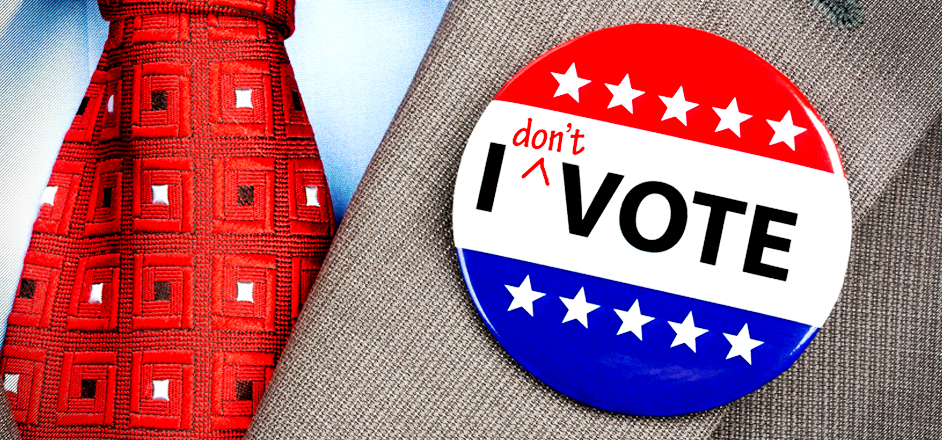"The lizard people control us all anyway … "
Despair has settled over the nation. Yet folks still find themselves trudging through to the end, with wan faces and shuffling gates. Depression? Recession? War? No: it's election time again.
This year, nearly as many people won't vote as will. And can you blame them?
"The lizard people control us all anyway."
"They're both terrible."
"It's my right."
"The thought of voting for either candidate makes me physically ill."
"I've never gotten called to jury duty and I think that's 'cause I've never registered."
“Voting is a sham."
"Colorado already has legal weed."
These are just a few of the reasons people have told us they aren't voting after asking around in real life and on social media. They’re all perfectly good responses, and likely why no one would ever blame those supporting Giant Meteor 2016 either, like 13 percent of the population does.
Then again, you could be angry at these people for being self-righteous, but let's be honest: you've abstained before, too. Maybe you always vote for president, but did you vote in every off-year election? Every primary? Every school board and city council vote? Every neighborhood association decision on mailbox sizes and acceptable house colors?
Not voting is, in the eyes of many zealous patriots, a betrayal of your country. For the right to vote, early Americans rebelled against the British, women banded together and risked beatings, and blacks marched and went to prison. And yet some of us still don't care. Among advanced countries, only the Swiss vote less than us, and that's because they decide nearly everything at a local level.
Rational choice theory — a kind of smarty-pants game theory — says voting is a waste of time. The costs of voting — driving to the poll or taking time to read about it or putting two stamps on an envelope — really do outweigh the benefits, so says the book "To Vote or Not to Vote."
One vote doesn't really matter. Every vote doesn't count. Never has a national election been decided by a single vote. Even the crazily close election of 2000, which boiled down to Florida, was decided by 537 people — 536 more people could have stayed home without changing a damn thing. Especially if you live in a solidly red or blue state like Oklahoma or California, your vote for President matters almost not at all.
Non-voters are younger, poorer and less educated, on average, than voters, and so the easy explanation for their non-voting is that they are lazy. Then again: isn't America? After all, America invented the drive-thru, the remote control, the Roomba and the Go-gurt.
Studies of non-voters usually describe them negatively. A big project on the non-voter lumps them into categories of "pessimists," "too busys," "strugglers" and "tuned outs." A long feature describes a non-voter as "distanced from the society in which he lives … willed into a certain protective ignorance about the way life works."
But laziness or cowardice isn't the reason a lot of people don't vote. They think of it as a positive act; they're participating in civil disobedience, the equivalent of not paying taxes or lying down in the middle of the street when the Army parade rolls through.
"It's meaningless," said George Carlin long ago. "This country was bought and sold and paid for a long time ago."
In some ways, not voting is the most American act. The founders said, "Fuck off, King George, we're not following your rules," same as nonvoters today say "Fuck off, Hillary and Donald, I'm not giving you my check mark."
But … the founders followed up their "Fuck off" statement with, "We're doing our own thing." And they did. They dropped monarchy and picked up democracy. And it's been, compared to monarchy, awesome.
So if you're going to drop democracy, make sure you pick up something else. Organize a community marijuana garden or a county militia or a TopFreedom rally or a Wieners Out campaign. Vote with your wallet or your feet or your heart or your head. Vote somehow. On a ballot or not. The despair might lift, just a little bit.



Leave a Reply